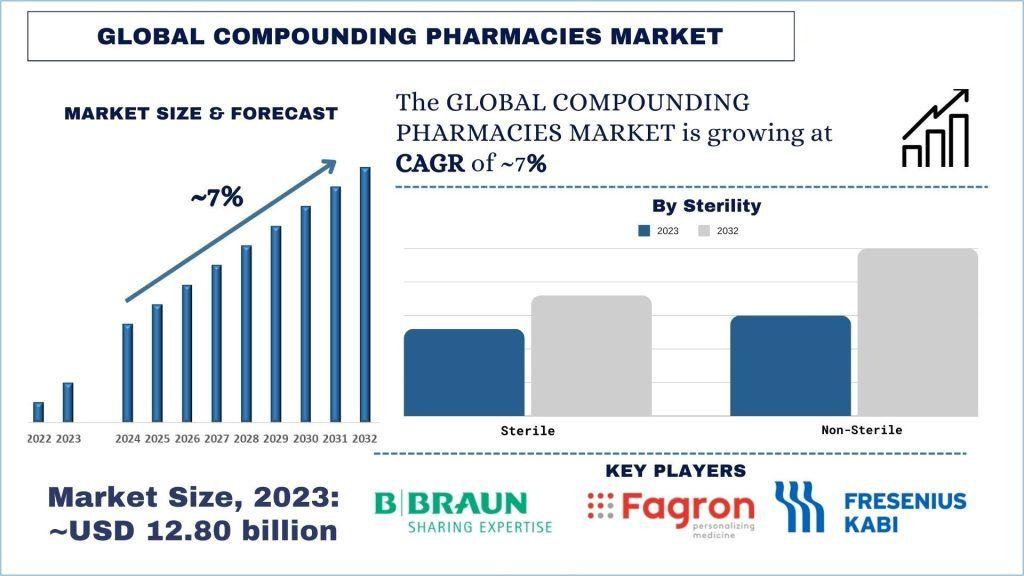Compounding Pharmacies Market Outlook: Innovations, Demand & Forecast (2024–2032) | UnivDatos

According to the UnivDatos, the increasing demand for personalized medicine, the rising prevalence of chronic diseases, and advancements in pharmaceutical compounding techniques will drive the global scenario of the compounding pharmacies market. As per their “Compounding Pharmacies Market” report, the global market was valued at USD 12.8 Billion in 2023, growing at a CAGR of about 7% during the forecast period from 2024 - 2032 to reach USD billion by 2032.
In the dynamic landscape of modern healthcare, personalized medicine is emerging as a cornerstone of patient-centered care. As the demand for tailored treatment options grows, compounding pharmacies are stepping into the spotlight, offering customized medications that meet the unique needs of individual patients. This article explores the evolution, demand, applications, costs, manufacturing processes, and implications of compounding pharmacies in today's healthcare landscape.
Access sample report (including graphs, charts, and figures): https://univdatos.com/reports/compounding-pharmacies-market?popup=report-enquiry
Demand:
The demand for compounding pharmacies arises from various factors, including the limitations of commercially available medications, the rise in chronic diseases, and the growing preference for personalized treatment options. Patients who have allergies, sensitivities, or specific dosage requirements often find it challenging to obtain suitable medications from traditional pharmacies. Compounding pharmacies address this gap by formulating medications tailored to each patient's needs, ensuring efficacy, safety, and compliance.
Allergy stats:
As per the National Institute of Health, in 2022, the worldwide prevalence of food allergy is estimated to be around 4% of children and 1% of adults, with an increased prevalence in the past two decades.
In 2023, according to new data from the CDC's National Center for Health Statistics, nearly 1 in 3 U.S. adults and more than 1 in 4 U.S. children reported having a seasonal allergy, eczema, or food allergy in 2021. Almost 6% of U.S. adults and children have a food allergy, with Black, Non-Hispanic adults and children one of the most likely to report this type of allergy.
Applications:
Compounding pharmacies offer a wide range of applications across different therapeutic areas. They can prepare medications in various dosage forms, including capsules, creams, gels, solutions, and suspensions. Typical applications include hormone replacement therapy, pain management, dermatology, pediatrics, and veterinary medicine. Compounded medications can also be customized to address specific conditions such as dermatological disorders, neuropathic pain, or hormone imbalances.
Cost:
While the cost of compounded medications may vary depending on factors such as ingredients, dosage forms, and formulation complexity, they are often perceived as more expensive than commercially available drugs. However, the cost-effectiveness of compounded medications should be evaluated in the context of their therapeutic benefits and the avoidance of adverse effects associated with standard formulations. Moreover, compounding pharmacies may offer cost-saving opportunities through bulk purchasing, generic alternatives, or insurance coverage.
Manufacturing:
The manufacturing process of compounded medications involves several steps, including ingredient selection, compounding, testing, and packaging. Compounding pharmacists carefully select pharmaceutical-grade ingredients and follow established compounding protocols to ensure the final product's quality, potency, and stability. Quality control measures, such as sterility testing and potency assays, are implemented to meet regulatory standards and ensure patient safety. Advanced technologies, such as automated compounding systems and electronic prescription management software, enhance compounding operations' efficiency, accuracy, and traceability.
Click here to view the Report Description & TOC: https://univdatos.com/reports/compounding-pharmacies-market
Conclusion:
In conclusion, compounding pharmacies play a vital role in modern healthcare by offering personalized medication solutions that address the unique needs of individual patients. With the rise of chronic diseases, the limitations of commercially available medications, and the increasing demand for personalized medicine, compounding pharmacies are poised for continued growth and innovation. However, regulatory compliance, quality assurance, and cost-effectiveness must be addressed to maximize the potential of compounding pharmacy services. As the healthcare landscape evolves, compounding pharmacies will remain essential partners in delivering customized care and improving patient outcomes.
Contact Us:
UnivDatos
Contact Number - +1 978 733 0253
Email - contact@univdatos.com
Website - www.univdatos.com
Linkedin- https://www.linkedin.com/company/univ-datos-market-insight/mycompany/
- Information Technology
- Office Equipment and Supplies
- Cars and Trucks
- Persons
- Books and Authors
- Tutorials
- Art
- Causes
- Crafts
- Dance
- Drinks
- Film
- Fitness
- Food
- Spellen
- Gardening
- Health
- Home
- Literature
- Music
- Networking
- Other
- Party
- Religion
- Shopping
- Sports
- Theater
- Wellness


